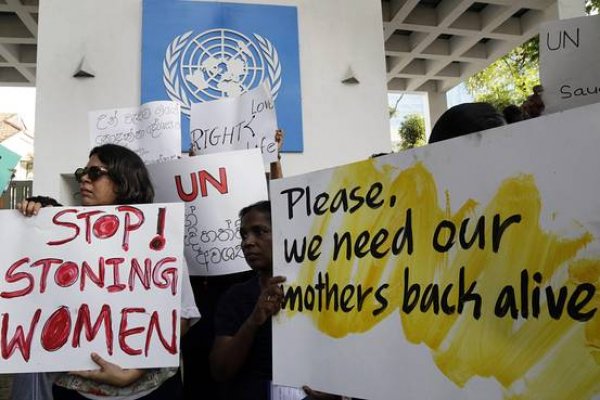In the past two years, the South Asian nation has had to pay to bring more than 2,000 Sri Lankan maids home from Saudi Arabia after they fled their jobs.
Sri Lanka brings home overseas workers every year from all over the globe, but the number that it has to help return from the Middle Eastern kingdom is highest.
Recent high-profile incidents in which returning maids have claimed abuse and even torture by their employers as well as cases in the kingdom where Sri Lankan house help has been convicted of breaking local laws and severely punished, has focused the island nation’s attention on the safety of its overseas workers.
“There has been a steady increase of housemaids returning,” said Sri Lanka Foreign Employees Bureau spokesman Upul Deshapriya. “Many continue to face difficult working conditions despite our efforts to train them and root out unscrupulous job agents,” that don’t provide proper training or vetting of employers, he said.
Around 1.2 million Sri Lankans work abroad and about 300,000 of them are in Saudi Arabia, mostly as maids. Close to 35% fewer maids went to the kingdom last year, as an economic slowdown weighed on demand for their services and concern about the treatment of maids hurt supply. Around 25,000 Sri Lankan maids went to Saudi Arabia last year compared with around 39,000 the previous year, according to the Sri Lanka Foreign Employees Bureau.
In November, a Saudi court sentenced a Sri Lankan woman to death for adultery. The case sparked protests and the Sri Lankan government backed an appeal against the sentence. In December, a Saudi court commuted the woman’s punishment to three years in prison.
It wasn’t the first time the treatment of domestic workers received international attention. In 2010, doctors in Sri Lanka removed 13 nails and five needles from a Sri Lankan housemaid who said her Saudi employer hammered them into her body. In 2013, a Sri Lankan housemaid was executed in Saudi Arabia after being convicted of killing a child in her care. Human rights organizations said her confession to the murder was coerced and her trial was not properly conducted.
Sri Lanka depends upon earnings of its overseas workers. As much as the equivalent of 12% of the island’s gross national product is generated in remittances, according to central bank data. Last year, Sri Lankan workers sent close to $6 billion home, making remittances the country’s largest foreign-exchange earner.
However, remittance growth has been slowing. Last year it shrank to just under 1%, a sharp decline from 9.5% the year before. The Central Bank of Sri Lanka called the deceleration a “worrying sign.”
Officials in both Sri Lanka and Saudi Arabia agree that part of the solution is better training of maids so that they know their rights and what to do if their rights are violated. Maids also need to understand the strict laws and punishments of Saudi Arabia.
Too often, Sri Lankan maids turn up in the kingdom ignorant about what they have signed up for and what to do when they need help. Recruitment agencies are supposed to screen and train the women as well as ensure they are well treated, ready for the job and knowledgeable about their rights.
Sri Lanka needs to do more to monitor recruitment agents and enforce accountability, said Harsha de Silva, Sri Lanka’s deputy foreign minister,
“We are not able to physically keep track of every person,” the minister said, adding that the best way to protect Sri Lankan workers is ensure they have “better jobs at home.”
Despite efforts by Sri Lanka’s government to monitor recruitment agencies, train housemaids and ensure they are paid well, a small number of the hundreds of thousands that go abroad are still abused, says Foreign Employment Promotion and Welfare Minister Thalatha Athukorale.
The two countries have a labor agreement covering domestic workers which outlines the pay, holidays and other rights of migrant employees and that their work contract should be in their language. But enforcement of the law is lax, says trade unions and activists fighting for migrant worker rights.
The Saudi Ministry of Labor said it protects workers’ rights and enforces contracts. It has set up a hotline where employees can file complaints against their employers in nine different languages.
“The Saudi government of course doesn’t approve the violations mentioned which could happen any society and between all its segments,” said Khalid Abalkhail, a spokesman for the ministry in an email.
The ministry said if foreign workers break Saudi law then they have to deal with the local security and judicial systems.
Mr. Abalkhail agreed that workers need more training before they arrive.
These countries “bear part of the burden of educating candidates for work in the kingdom of their rights and duties, which would reduce the exposure to such individual abusive acts, and also to help raise workers’ awareness of the subsequent legal proceedings in case of abuse,” he said.
(blogs.wsj.com)






